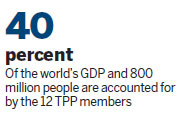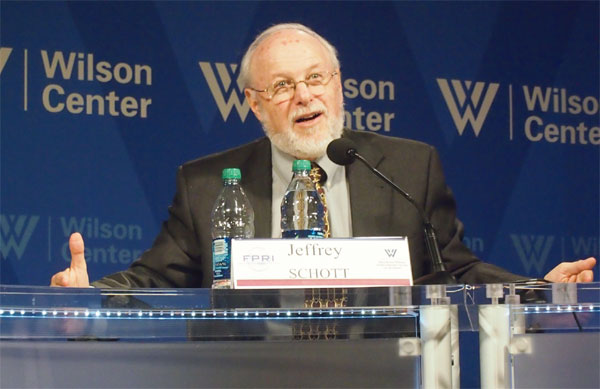US experts hope China joins trade partnership
Updated: 2014-10-31 14:03
By Chen Weihua in Washington(China Daily USA)
|
||||||||
|
Jeffrey Schott, a senior fellow at the Peterson Institute for International Economics, talks about the impact of China's possible participation in the Trans-Pacific Partnership (TPP) in a seminar in the Wilson Center in Washington on Thursday. Sheng Yang / For China Daily |
US experts believe that encouraging China to join the Trans-Pacific Partnership (TPP) negotiations will have a huge impact on US-China relations and the future trade framework in the Asia-Pacific region.
Chinese Vice-Finance Minister Zhu Guangyao expressed in Washington recently that TPP would be "incomplete" in the long term without China.
Jeffrey Schott, a senior fellow at the Washington-based Peterson Institute for International Economics, believes that China's participation means a great new opportunity for managing the crucial US-China economic relationship.
"Often you can do things in a regional context that you can't do bilaterally," Schott said on Thursday in a talk at the Wilson Center in Washington.
He said China has begun to seriously look at the implications of TPP for Chinese economic development and how its implementation could complement and reinforce China's domestic economic reforms rolled out at the Third Plenum of the 18th Party Central Committee last November.
China had been wary of US-led TPP negotiations two years ago and many in China regarded it as a US scheme to contain China economically and strategically. The views have evolved over the time. Schott said regular consultation between US and Chinese officials on the progress of TPP negotiations have contributed to China's now more open and receptive attitude of TPP.
Schott's comments came just a day after Chinese Foreign Minister Wang Yi announced in Beijing that China and other APEC members will reach an important agreement during the APEC Summit in Beijing next month to push forward the process for Free Trade Area for Asia Pacific (FTAAP) to achieve a better regional economic integration.

China hopes the FTAAP would help integrate the many bilateral and multilateral free trade agreements that exist now among Asia-Pacific economies and reduce the risk of overlap and fragmentation.
TPP and RCEP (Regional Comprehensive Economic Partnership), led ASEAN and favored by China, are the two multilateral agreements being negotiated in the region. While China has not yet been part of the TPP negotiations. US is not participating or qualified to participate RCEP talks because it would require US to have a free trade agreement with ASEAN.
Schott believes that if China continues to move toward TPP this decade, then there will be a strong impetus to use it as the driver for Asia-Pacific economic integration.
"If for political reasons, both in Washington and Beijing, and there is a mistrust about how that will work, we will have to consider some hybrid approaches to bridging the Pacific, bridging the US and Chinese economic interest, and perhaps an umbrella agreement that covers both TPP and RCEP provisions," he said.
He expressed optimism that that the two countries will be working more closely on trade, which will have political and strategic benefits for both.
Bill Krist, senior policy scholar of Asia program at the Wilson Center, said he would like to see China join the TPP negotiations down the road. "But they have to agree to the high standards," he said.
He also believes it's a good idea for US President Barack Obama to send a message to encourage China's participation when he visits Beijing next month.
Krist believes it's impossible to allow China into the negotiations at this point because the talks have already gone a long way among the 12 members.
"But it's good if he (Obama) encourages China to come in and I hope he would listen to China's thoughts and concerns on what's going on in the negotiations and so on. But for China to join on at this point would be impossible," Krist said.
Bernard Gordon, professor emeritus at the University of New Hampshire, wrote an article in April calling for China to be brought into TPP to maximize the impact of the partnership and to prove that it is not a strategy to contain China.
Gordon told China Daily on Thursday that China has the capacity to take steps that lead to TPP membership.
"Such a decision will not only be of major importance to the international economy, but just as important, are of major importance to China itself," he said, citing China's reform agenda to assure its long-term competitiveness in global economy.
"In a way that is reminiscent of China's decision more than a decade ago to join the WTO, the path today to continuing those reforms is to join the TPP," he said.
Gordon said he was encouraged that Vice Finance Minister Zhu has indicated China's continuing interest in the TPP.
"In practical terms, the time to 'seal the bargain' is when Premier Xi meets President Obama at the forthcoming APEC meetings this coming month," he said.
The 12 TPP members, which account for 800 million people and 40 percent of the world's GDP, had their latest round of talks in Australia last week. There were no major breakthroughs on thorny issues such as opening Japan's agricultural and automotive market.
Domestic political pressure has made it impossible for Japanese Prime Minister Shinzo Abe to make such concessions. Meanwhile, it would also be hard for the US to open greatly its sugar and dairy market.
While Schott expects the TPP negotiations to be concluded in the first half of next year, there is wide suspicion about whether those differences could be narrowed anytime soon.
chenweihua@chinadailyusa.com

 Art Taipei 2014 draws international artists
Art Taipei 2014 draws international artists
 Tibetan culture to display splendor in Canada
Tibetan culture to display splendor in Canada
 Reclaiming a piece of history
Reclaiming a piece of history
 Across Americas over the week (Oct 24-30)
Across Americas over the week (Oct 24-30)
 Halloween haunts China as popularity grows
Halloween haunts China as popularity grows
 At least 4 killed in small plane crash in Kansas
At least 4 killed in small plane crash in Kansas
 Road trip to Arxan National Forest Park
Road trip to Arxan National Forest Park
 Top 10 richest Chinese in 2014
Top 10 richest Chinese in 2014
Most Viewed
Editor's Picks

|

|

|

|

|

|
Today's Top News
Space tourism set back by accident
Chinese Internet companies find Brazil attractive
US spaceship test flight failure kills at least one
Breast cancer a factor in Shanghai's low birth rate: doctor
The rise of intolerance
Olympics bid fuels drive for clean air
Lenovo buys Motorola Mobility
China rail reps visit California
US Weekly

|

|








